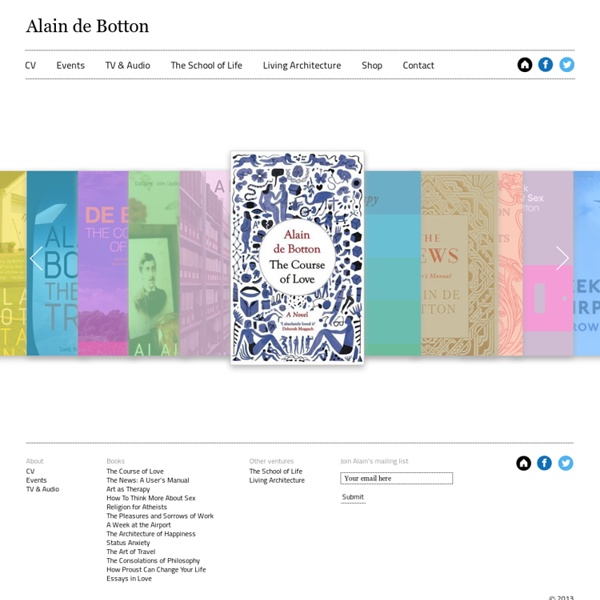



charles hugh smith-Weblog and Essays Turn Off, Tune Out, Drop Out November 5, 2018 An unknown but likely staggeringly large percentage of small business owners in the U.S. are an inch away from calling it quits and closing shop. Timothy Leary famously coined the definitive 60s counterculture phrase, "Turn on, tune in, drop out" in 1966. (According to Wikipedia, In a 1988 interview with Neil Strauss, Leary said the slogan was "given to him" by Marshall McLuhan during a lunch in New York City.) An updated version of the slogan might be: Turn Off, Tune Out, Drop Out: turn off mobile phones, screens, etc.; tune out Corporate Media, social media, propaganda, official and unofficial, and drop out of the status quo economy and society.
Does more information mean we know less? 14 January 2011Last updated at 17:55 We pay a price for all the information we consume these days - and it's knowing less, says Alain de Botton. One of the more embarrassing difficulties of our age is that most of us have quite lost the ability to concentrate, to sit still and do nothing other than focus on certain basic truths of the human condition. A Living Organized Summary of Rounding the Earth's Primary Mission Last edited: October 25, 2021 While it will take time to weave together the many threads of the stories I'm writing at Rounding the Earth, ultimately, they do all fit together into a cogent story of how and why we are traveling through a portal of change, and whether the results will be freedom or slavery for humanity on the other side. Understanding this story of mass global change is important, and frankly difficult. I find myself forming new insights every day as I research so many topics. I do not pretend to be able to make sense of all of it, but filtering so many thousands of pages of reading into connected frameworks certainly helps. Let's make sense of it all together.
Has our relationship with nature changed? 21 January 2011Last updated at 17:48 Fear of ecological destruction causes us to pity and protect nature rather than oppose it, says Alain de Botton The environmental dangers that now face mankind put non-scientific philosophical types like me in an awkward situation. We have to acknowledge that we can have precisely nothing interesting to say on the two most important questions in the air right now, namely: "What is going to happen to the human race?"
Zoe Phin – Zoe's Insights 81m.org has been keeping track of White House videos since early February. Today I reveal the running count of dislikes removed by YouTube since the inception of 81m.org. 3.9 Million dislikes removed! The entire list of removals by video is archived here. No sex please, we're British: Alain de Botton on sex Stylist’s first sex survey revealed that 65% of you want more sex. Philosopher Alain de Botton explains what’s getting in the way… It’s rare to get through this life without feeling we are somehow a bit odd about sex – generally with a degree of secret agony, perhaps at the end of a relationship, or as we lie in bed frustrated next to our partner, unable to go to sleep. It’s an area in which most of us have a painful impression, in our heart of hearts, that we are quite unusual. Despite being one of the most private activities, sex is surrounded by ideas about how normal people are meant to feel and deal with the matter.
NY- Attention Gargoyle Hunters, CCNY is covered in them City College of New York at 137th and Amsterdam. One block west of the #1 subway stop has a treasure trove of gargoyles adorning their circa 1908 Gothic campus buildings. They look like they were made by the same artisan’s who sculpted the Chicken Soup Gargoyles on 11oth Street, no? Tart of the Week: Harriette Wilson Like her predecessor, Mary Robinson, before her Harriette Wilson became famous for her sex appeal, tenacity, and her uncanny ability to blackmail. Born in 1786, Hariette Dubouchet, teeters on being an official 18th century tart since most of work was done during the Regency period. But I will not let that disqualify her from her prestigious title, especially since this blog is more about the long 18th century. Harriette grew up surrounded by the sounds of constant ticking, her father being a Swiss clockmaker who set roots in England. She was also surround by her fourteen siblings.
German cabarets Introduction Where do we get our politics from? Newspapers? State speeches? How about a crowded nightclub with smoke filled rooms, small tables, dim lights, and the distant base-line thump of a piano with a glass of beer resting on it? Culture, politics and history have often had a complex relationship—each feeding into each other, but sometimes failing to recognize the other’s significance.
Aestheticism The Peacock Room, Aesthetic Movement designed by James Abbott McNeill Whistler, one of the most famous examples of Aesthetic style interior design Aestheticism (or the Aesthetic Movement) is an art movement supporting the emphasis of aesthetic values more than social-political themes for literature, fine art, music and other arts.[1][2] It was particularly prominent in Europe during the 19th century, but contemporary critics are also associated with the movement, such as Harold Bloom, who has recently argued against projecting social and political ideology onto literary works, which he believes has been a growing problem in humanities departments over the last century. Aesthetic literature[edit] The British decadent writers were much influenced by the Oxford professor Walter Pater and his essays published during 1867–68, in which he stated that life had to be lived intensely, with an ideal of beauty.